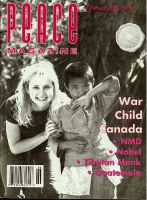
Peace Magazine Apr-Jun 2002, page 30. Some rights reserved.
Search for other articles by PMag staff here
Thomas Breslin
This book was not written for peaceniks but anyway some of us will find it fascinating. With a wide brush it paints a considerable portion of world history - from China (ancient and modern) to Greece vs. Persia; Rome vs. the Celts and Germans; Byzantium vs. Venice; the Anglo-Saxons vs. the Irish and Normans; the Britain vs. colonized peoples; America vs. Britain; and finally to hegemonic America vs. the world.
We speak of "carrots" and "sticks," but most histories of international affairs describe only the sticks - the uses of military might for coercive purposes. Breslin, on the other hand, pays just as much attention to the carrots - the use of pleasures to induce compliant behavior on the part of foreign powers. By "pleasure," he refers to such treats as bribes, sumptuous banquets, flattery, and hospitality by brilliant courtesans. I warned you: This is not about social justice, but about realpolitik played with unusual currencies. Sometimes the pleasurable incentives were used to support military goals, as for example when the Persians bribed the influential Delphic oracle to predict outcomes of projected battles in their own favor.
The book provides other tidbits that we were not taught in school. For instance, we learn that no US president has matched the success on foreign affairs of Thomas Jefferson, who used both force and gold in dealing with the pirate who ruled Tripoli. "He also used sex to smooth negotiations with the Tunisian minister by providing him with a Greek prostitute and charging the State Department budget for 'appropriations for foreign intercourse.'"
The British used bribery with inconsistent results. They succeeded in retaining Daniel Webster, who represented the United States in negotiations over the border between Maine and Canada. The resulting treaty ceded much of the land claimed by the United States to England. In a less successful use of gifts, the English queen sent the sultan of Zanzibar a heavy carriage, useless in his roadless country, but used by the sultan as a gift to the Nizam of Hyderabad.
American gift-giving has sometimes been strategically wise, as for example when that country created the Marshall Plan and the Peace Corps, both of which won friends abroad.
Breslin teaches the history of foreign relations, and his writing shows that he thinks more like a historian than a comparative social scientist. That is, although his objective is to compare the relative effectiveness of militarism and these pleasurable incentives, he does not offer many generalizations weighing these two approaches. He simply reports, time after time, page after page, what diplomats and rulers did in their socio-historical situations. You, the reader, must draw your own conclusions about what worked more often. It seems to me that pleasure was more frequently successful - and definitely cheaper than supporting an army. The "pleasures" were not always particularly attractive ethically, however. It feels strange to conclude a book review by recognizing bribery as a peaceful diplomatic tool but, as they say about getting old, it certainly beats the alternative.

Peace Magazine Apr-Jun 2002, page 30. Some rights reserved.
Search for other articles by PMag staff here